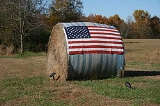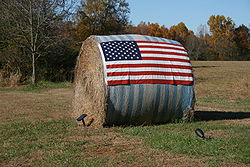
American nationalism
Encyclopedia

People of the United States
The people of the United States, also known as simply Americans or American people, are the inhabitants or citizens of the United States. The United States is a multi-ethnic nation, home to people of different ethnic and national backgrounds...
. Nationalism
Nationalism
Nationalism is a political ideology that involves a strong identification of a group of individuals with a political entity defined in national terms, i.e. a nation. In the 'modernist' image of the nation, it is nationalism that creates national identity. There are various definitions for what...
is the correct and recognized term for the associated ideology
Ideology
An ideology is a set of ideas that constitutes one's goals, expectations, and actions. An ideology can be thought of as a comprehensive vision, as a way of looking at things , as in common sense and several philosophical tendencies , or a set of ideas proposed by the dominant class of a society to...
and political movements, within the present United States, and during its history.
Origins
The United States traces its origins to colonies founded by the Kingdom of EnglandKingdom of England
The Kingdom of England was, from 927 to 1707, a sovereign state to the northwest of continental Europe. At its height, the Kingdom of England spanned the southern two-thirds of the island of Great Britain and several smaller outlying islands; what today comprises the legal jurisdiction of England...
in the early 17th century. Each colony was independently governed and was under the authority of the Crown; a colonist had no duty to colonies other than their own. By 1732, the Kingdom of Great Britain
Kingdom of Great Britain
The former Kingdom of Great Britain, sometimes described as the 'United Kingdom of Great Britain', That the Two Kingdoms of Scotland and England, shall upon the 1st May next ensuing the date hereof, and forever after, be United into One Kingdom by the Name of GREAT BRITAIN. was a sovereign...
had 13 colonies established in British America
British America
For American people of British descent, see British American.British America is the anachronistic term used to refer to the territories under the control of the Crown or Parliament in present day North America , Central America, the Caribbean, and Guyana...
. When the colonies faced a threat during the French and Indian War
French and Indian War
The French and Indian War is the common American name for the war between Great Britain and France in North America from 1754 to 1763. In 1756, the war erupted into the world-wide conflict known as the Seven Years' War and thus came to be regarded as the North American theater of that war...
, the Albany Plan
Albany Plan
The Albany Plan of Union was proposed by Benjamin Franklin at the Albany Congress in 1754 in Albany, New York. It was an early attempt at forming a union of the colonies "under one government as far as might be necessary for defense and other general important purposes" during the French and...
proposed a union between the colonies. Although unsuccessful, it served as a reference for future discussions of independence.
Soon after, the colonies faced several common grievances over acts passed by the British Parliament, including taxation without representation. As the dispute escalated, colonists started to view the British rule as oppressive and hostile, and sought cooperation with other colonies in response. This cooperation led to the Continental Congress
Continental Congress
The Continental Congress was a convention of delegates called together from the Thirteen Colonies that became the governing body of the United States during the American Revolution....
, the Declaration of Independence
United States Declaration of Independence
The Declaration of Independence was a statement adopted by the Continental Congress on July 4, 1776, which announced that the thirteen American colonies then at war with Great Britain regarded themselves as independent states, and no longer a part of the British Empire. John Adams put forth a...
, the American Revolutionary War
American Revolutionary War
The American Revolutionary War , the American War of Independence, or simply the Revolutionary War, began as a war between the Kingdom of Great Britain and thirteen British colonies in North America, and ended in a global war between several European great powers.The war was the result of the...
, and ultimately independence. Ties between the states strengthened with the ratification of the United States Constitution
United States Constitution
The Constitution of the United States is the supreme law of the United States of America. It is the framework for the organization of the United States government and for the relationship of the federal government with the states, citizens, and all people within the United States.The first three...
.
Post-Civil War
The American Civil WarAmerican Civil War
The American Civil War was a civil war fought in the United States of America. In response to the election of Abraham Lincoln as President of the United States, 11 southern slave states declared their secession from the United States and formed the Confederate States of America ; the other 25...
marked the greatest transition in American national identity. The ratification of the Fourteenth
Fourteenth Amendment to the United States Constitution
The Fourteenth Amendment to the United States Constitution was adopted on July 9, 1868, as one of the Reconstruction Amendments.Its Citizenship Clause provides a broad definition of citizenship that overruled the Dred Scott v...
and Fifteenth
Fifteenth Amendment to the United States Constitution
The Fifteenth Amendment to the United States Constitution prohibits each government in the United States from denying a citizen the right to vote based on that citizen's "race, color, or previous condition of servitude"...
amendments settled the basic question of national identity: Who was a citizen of the United States? Under the amendments, anyone born in the United States and subject to its jurisdiction was a citizen, regardless of ethnicity or social status. However, Native Americans were not to gain citizenship under these amendments. In 1919 all Natives who had served in the military were granted full citizenship, but the rest of the Native Americans were not included as citizens until 1924, when the Indian Citizenship Act
Indian Citizenship Act of 1924
The Indian Citizenship Act of 1924, also known as the Snyder Act, was proposed by Representative Homer P. Snyder of New York and granted full U.S. citizenship to America's indigenous peoples, called "Indians" in this Act...
was passed by Congress.
Nationalism in the contemporary United States
Nationalism remains a topic in the modern United States. Rutgers UniversityRutgers University
Rutgers, The State University of New Jersey , is the largest institution for higher education in New Jersey, United States. It was originally chartered as Queen's College in 1766. It is the eighth-oldest college in the United States and one of the nine Colonial colleges founded before the American...
professor Paul McCartney, for instance, argues that as a nation defined by a creed and sense of mission, Americans tend to equate their interests with those of humanity, which in turn informs their global posture. While some agree with Professor McCartney, a number of American Nationalists (probably a minority) have committed violent crimes in the name of their beliefs.
The September 11, 2001 attacks
September 11, 2001 attacks
The September 11 attacks The September 11 attacks The September 11 attacks (also referred to as September 11, September 11th or 9/119/11 is pronounced "nine eleven". The slash is not part of the pronunciation...
on the United States led to a wave of nationalist expression. This was accompanied by a rise in military enlistment that included not only lower-income Americans, but also middle-class and upper-income citizens.
See also
- American exceptionalismAmerican exceptionalismAmerican exceptionalism refers to the theory that the United States is qualitatively different from other countries. In this view, America's exceptionalism stems from its emergence from a revolution, becoming "the first new nation," and developing a uniquely American ideology, based on liberty,...
- Assimilation (sociology)
- Melting potMelting potThe melting pot is a metaphor for a heterogeneous society becoming more homogeneous, the different elements "melting together" into a harmonious whole with a common culture...
- NationalismNationalismNationalism is a political ideology that involves a strong identification of a group of individuals with a political entity defined in national terms, i.e. a nation. In the 'modernist' image of the nation, it is nationalism that creates national identity. There are various definitions for what...
- PatriotismPatriotismPatriotism is a devotion to one's country, excluding differences caused by the dependencies of the term's meaning upon context, geography and philosophy...

